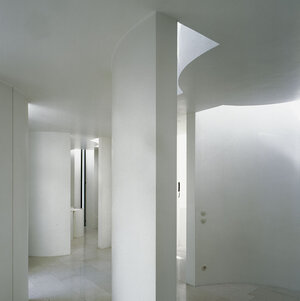
×
![Buchcover ISBN 9783936681611]()
Architekten, Kunsthistoriker, Bauhistoriker, Designer, Architekturtheoretiker
Johannes Peter Hölzinger
Bauten und Projekte 19502010/Buildings and Projects 19502010
von Gerd de Bruyn, Peter Cachola Schmal, Denk Andreas und Förster YorckJohannes Peter Hölzinger studied architecture at the Städelschule in Frankfurt am Main from 1954 to 1957. After a residency fellowship at the Deut-sche Akademie Villa Massimo in Rome he founded a 'planning association for new forms of the environment' in 1965 together with Zero artist Hermann Goepfert, who has since died. One of the most successful results of his work with Goepfert was a new design for the Schloßpark in Karlsruhe on the occasion of the Bundesgar-tenschau in 1967, which won a major German architectural prize, the Hugo-Häring-Preis. From 1991 until his retirement in 2002 Hölzinger directed the art and public-space course at the Aka-demie der bildenden Künste in Nuremberg.
Individualistic and oppositional in comparison to other post-World War II architectural achievements, the design of Hölzinger’s buildings is very distinctive. The playful elements of Postmodern-ism are as alien to his work as the functionalism of New Building. Because of his association with Hermann Goepfert, Hölzinger is much more closely connected with the art scene of his time. The integration of art and architecture is a unique feature of his buildings. If we try to assign a cat-egory to this 'object architecture' (a term he coined himself), we will find less overlap with architecture than with fine art. From the very beginning Hölzinger saw architecture as an artistic discipline. Light kinetics offered him important new perspectives. Lighting design and the resulting colour changes of white walls play a vital role in his work.
Gerd de Bruyn studied literature and musicol-ogy in Frankfurt am Main und was subsequent-
ly enrolled in the architecture class directed by Günter Bock at the Städelschule in Frankfurt. Since 2001 he has been professor of architectural theory and director of the Institut Grundlagen moderner Architektur und Entwerfen at Stuttgart University. Peter Cachola Schmal studied architecture in Darmstadt. Since 2006 he has been director of the Deutsches Architekturmuseum in Frankfurt am Main. Andreas Denk is editor in chief of the journal der architekt of the Bund Deutscher Architekten and teaches architectural theory at the Fachhochschule Köln. Yorck Förster studied philosophy, sociology and art education in Frankfurt am Main and is exhibition curator of the Deutsches Architekturmuseum. Gerd Weiß studied art history, German studies, sociology and journalism in Göttingen. Since 1999 he has been president of the Landesamt für Denkmalpflege Hessen, and since 2006 the official representative of the state of Hesse for the UNESCO World Heritage programme in Hesse.


